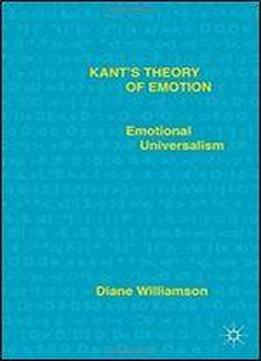
Kants Theory Of Emotion: Emotional Universalism
by D. Williamson /
2015 / English / PDF
1.5 MB Download
Williamson explains, defends, and applies Kant's theory of emotion. Looking primarily to the Anthropology and the Metaphysics of Morals, she situates Kant's theory of affect within his theory of feeling and focuses on the importance of moral feelings and the moral evaluation of our emotions. Feelings, for Kant, are physiological occurrences (pains and/or pleasures) that are caused by the cognitive faculty, including perception and present experience. Their underlying thoughts must be morally evaluated. She illustrates both the role that emotions play in developing virtue and the role they can play in leading to vice and evil. Kant's theory has an advantage over current cultural and research trends because it neither suggests that we must blindly follow our feelings nor that emotions are irrational forces that must be overcome. Instead, Kant's theory does the best job of helping us to understand and evaluate our emotions.











